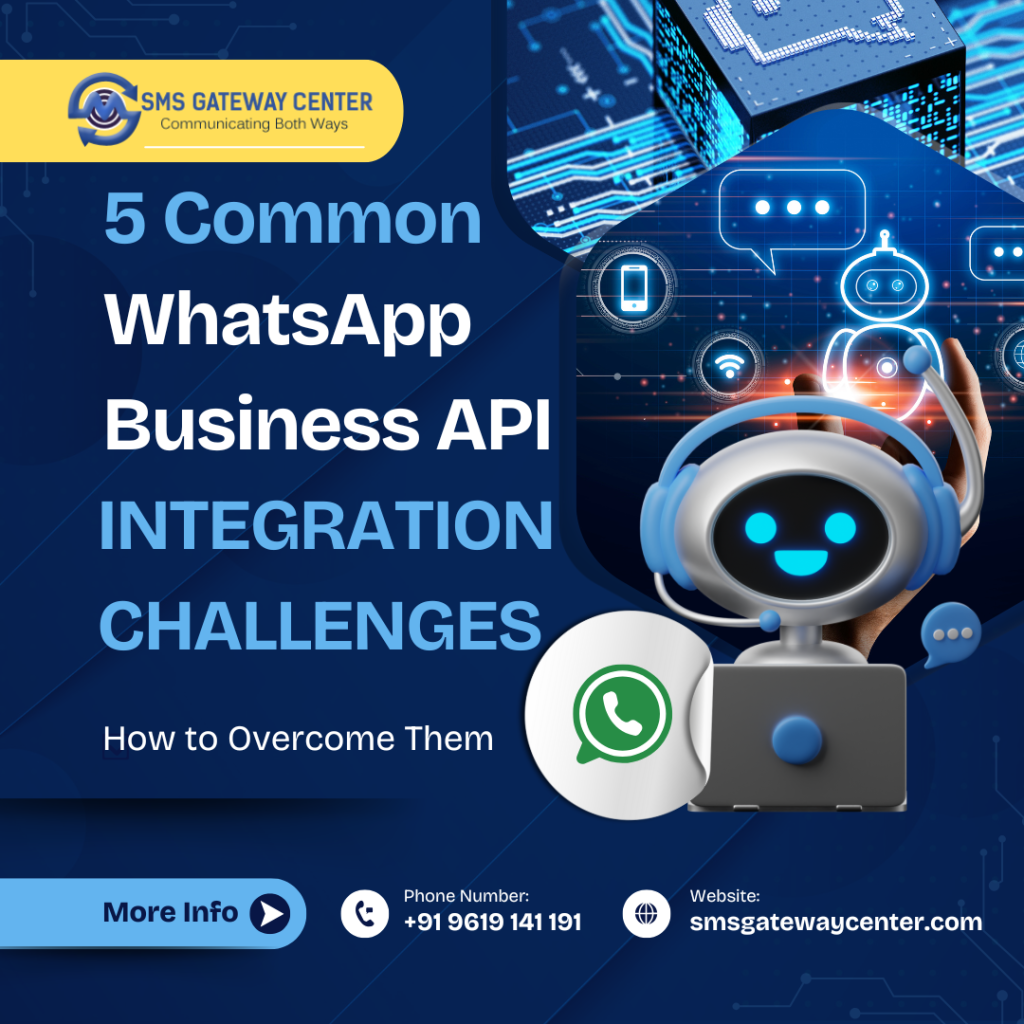5 Common WhatsApp Business API Integration Challenges and How to Overcome Them
The WhatsApp Business API has become a game-changer for businesses, enabling personalized communication, enhancing customer support, and driving engagement. However, integrating and effectively using the API comes with its own set of challenges. In this article, we’ll dive into five common WhatsApp Business API integration challenges and provide actionable solutions to overcome them, ensuring smooth implementation and optimized results.

1. Obtaining API Access
One of the primary hurdles businesses face is obtaining access to the WhatsApp Business API. Meta requires businesses to meet specific criteria, such as verifying their business, adhering to compliance guidelines, and having an active Facebook Business Manager account.
Challenges:
- Business verification process delays.
- Limited knowledge about compliance requirements.
- Denial of API access due to policy violations.
Solutions:
- Complete Facebook Business Verification:
Ensure your business is fully verified on Facebook Business Manager. This includes submitting legal documents such as business registration certificates and utility bills. - Work with Official Business Solution Providers (BSPs):
Collaborate with Tech Solution providers like SMSGatewayCenter to streamline the API onboarding process. Partners handle verification, compliance, and integration seamlessly. - Adhere to WhatsApp’s Commerce and Messaging Policies:
Review WhatsApp’s policies to ensure your business practices and message templates align with the platform’s standards.
2. Template Rejection and Approval Delay
WhatsApp requires message templates for notifications, alerts, or promotional campaigns. These templates must comply with strict formatting and content guidelines, leading to potential rejections and approval delays.
Challenges:
- Non-compliant templates get rejected.
- Approval delays disrupt campaigns.
- Difficulty understanding template guidelines.
Solutions:
- Use Pre-Approved Templates:
Start with templates provided by Tech Partners like SMSGatewayCenter. These templates are pre-approved and align with WhatsApp’s requirements. - Follow WhatsApp Template Guidelines:
- Use clear and concise language.
- Avoid promotional or misleading content in utility or authentication templates.
- Include dynamic placeholders for personalization.
- Monitor Template Changes:
Meta frequently updates template categorization guidelines. Leverage notification tools like SMSGatewayCenter’s Unify Panel to sync changes automatically.
Here’s a revised version of the third point, replacing “Handling Compliance and DLT Registration in India” with a new, relevant challenge for WhatsApp Business API integration:
3. Ensuring Quick Response Times for Real-Time Conversations
The Challenge:
WhatsApp is widely used for real-time communication, and customers expect immediate responses. However, delays in response times can occur due to:
- Inefficient chatbot or automation configurations.
- Server response lag during peak traffic.
- Suboptimal infrastructure for managing large volumes of incoming messages.
These delays can lead to poor customer satisfaction and missed opportunities to convert inquiries into sales.
The Solution:
- Optimize Infrastructure: Use a reliable and scalable hosting solution for your WhatsApp Business API setup. Cloud-based infrastructure with auto-scaling can handle high traffic seamlessly.
- Implement Chatbots and Automation: Configure intelligent chatbots to handle FAQs, route inquiries to human agents only when necessary, and use pre-configured quick replies.
- Use Webhooks Effectively: Implement webhooks to receive real-time updates and maintain an always-on connection for instant communication.
- Performance Monitoring: Continuously monitor response times using analytics tools and set alerts for anomalies. This will help you take immediate action to address delays.
- Agent Chats: Use our in-built Agent Chat inbox to communicate with your customers.
By focusing on infrastructure and automation efficiency, businesses can maintain the quick response times expected by WhatsApp users.
4. Scalability and Load Management
Businesses often struggle to manage high message volumes, especially during promotional campaigns or peak seasons. This can lead to delays, message drops, or API throttling.
Challenges:
- API rate limits affecting high-volume messaging.
- Delayed or undelivered messages during spikes.
- Limited infrastructure scalability.
Solutions:
- Utilize BSP Infrastructure:
Leverage SMSGatewayCenter’s scalable infrastructure, which supports high message throughput and optimizes API rate limits. - Implement Message Queuing:
Use message queuing systems to handle spikes in traffic. Messages are processed in batches, ensuring timely delivery without overwhelming the API. - Monitor API Usage:
Track API usage metrics using the SMSGatewayCenter dashboard to identify and resolve bottlenecks proactively.
5. Integration with Existing Systems
Integrating the WhatsApp Business API with existing CRMs, ERPs, or customer support tools can be a technical challenge, especially for businesses without in-house technical expertise.
Challenges:
- Lack of technical knowledge for integration.
- Difficulty syncing WhatsApp conversations with CRM systems.
- Managing data across multiple platforms.
Solutions:
- No-Code/Low-Code Integration:
Use SMSGatewayCenter’s pre-built integrations for popular CRMs like Salesforce, HubSpot, and Zoho. These tools minimize the need for custom development. - Webhook Automation:
Set up webhooks to automatically sync WhatsApp messages with your existing systems. This enables real-time updates and reduces manual effort. - Leverage APIs for Customization:
If custom integration is required, utilize SMSGatewayCenter’s comprehensive API documentation and technical support team.
Additional Tips for Seamless WhatsApp Business API Integration
- Train Your Team:
Educate your marketing, support, and IT teams on the best practices for using the WhatsApp Business API effectively. - Regularly Audit Message Templates:
Conduct periodic audits of your templates to ensure they comply with the latest guidelines and are aligned with customer expectations. - Monitor Campaign Performance:
Use analytics tools to track message delivery, read rates, and customer engagement. Optimize campaigns based on insights. - Partner with a Reliable BSP:
SMSGatewayCenter offers end-to-end solutions, from onboarding and compliance to integration and scalability. Partnering with an experienced Tech Partner ensures a smoother experience.
Conclusion
Integrating the WhatsApp Business API can transform the way you communicate with customers, but it’s essential to address the technical and operational challenges that come with it. By following the solutions outlined above, businesses can overcome common hurdles and unlock the full potential of WhatsApp for customer engagement.
SMSGatewayCenter is here to help you navigate these challenges with expert guidance, powerful tools, and reliable infrastructure. Ready to take your business communication to the next level? Contact us today to learn more about our WhatsApp Business API integration services!

